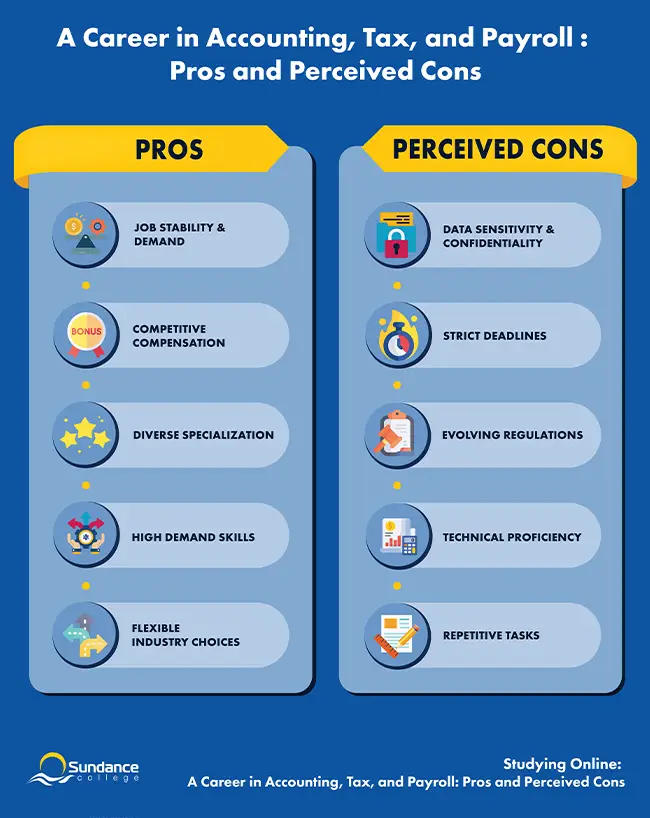Blog / Is Accounting and Payroll a Good Career? This Graduate’s Story Says It All
Is Accounting and Payroll a Good Career? This Graduate’s Story Says It All

Accounting, Tax, and Payroll Diploma
- Accounting Assistant/Technician
- Bookkeeper
- Income Tax Return Preparer
- Payroll Administrator
Table of Contents
When you stand at a crossroads in your career, it’s entirely normal to feel some uncertainty. After all, the decision you make can profoundly shape your life’s course.
So, when you turn to Google and ask, “Is accounting and payroll a good career?”, you’re seeking reliable guidance.
Google’s algorithms will likely provide you with a payroll clerk’s job outlook on the Job Bank website or an accounting technician’s salary reports on Indeed, both of which can provide valuable insights. But can you trust these numbers alone to make the right decision?
Chances are, what you’re truly looking for are inspiring stories of individuals who once stood exactly where you are now – uncertain about their future – yet succeeded in choosing a path that led them to a better life.
So, to answer your question, we invite you to take the journey of Mary Ann L., a graduate of Sundance College’s Commerce: Accounting, Tax, and Payroll program first. We believe her reasons and experiences will inspire and guide you towards making a decision.
Alongside her success story, in this article, you’ll discover the demand for accounting and payroll professionals, the responsibilities awaiting you, skills essential for success, and the educational steps needed for a rewarding career in finance and accounting.
By the end of this piece, you’ll be fully equipped with the knowledge you need to make an informed decision about whether a career in this field is for you.
Mary Ann’s Path to a Career in Accounting and Payroll

Working Without Canadian Credentials
Originally from the Philippines, Mary Ann has a background in teaching. When she moved to Canada, she found herself juggling three jobs – fast food, grocery, and cleaning – just to make ends meet. She recalls:
“Teaching was my passion back home, but life took me on a different path when I immigrated to Canada. It was a challenging time. I had to do whatever I could to survive.”
A Dream Of Stability And Growth
Despite the relentless schedule, Mary Ann had a dream – a dream of a rewarding job that would provide financial stability and a regular schedule. She wanted to work in an office, much like the one she had back in the Philippines.
“I knew there had to be a better way. I wanted a job that could give me stability and a chance to grow. I knew it was time for a change”, she shared.
The Decision To Pursue An Accounting And Payroll Career
Mary Ann knew that to transition into a career that offered more than just survival, she needed the right education and training. Accounting and payroll, with their stable and promising prospects, appealed to her:
“I did some research and found that accounting and payroll careers were in high demand in Canada. It felt like the right path for me. So, I decided to go for it.”
Challenges And Triumphs
While Mary Ann was excited about returning to school, the road was not without its challenges. Balancing multiple jobs with homework and exams was demanding:
“It wasn’t easy. I had to work hard to keep up with my studies. There were times when I was exhausted. I even fell asleep during one of my exams”, she confesses.
Yet, amidst these challenges, Mary Ann found unwavering support from her instructors:
“My instructors at Sundance College were amazing. They believed in me and pushed me to excel. They even organized extra sessions to help me understand accounting better. It made all the difference.”
A Bright Future: Life After Graduation
Mary Ann’s persistence paid off. She didn’t just graduate; she completed her practicum and secured a job in the accounting, tax, and payroll field. She was recruited by the largest Canadian auditing firm:
“I worked hard during my practicum, and it paid off. It was a dream come true.”
What lessons can you learn from Mary Ann’s story?
With determination, and the right education and support, you can build a fulfilling career in accounting and payroll. And here are five reasons to choose this path.
5 Reasons to Choose a Career in Accounting, Tax, and Payroll

A career in accounting, tax, and payroll (ATP) offers several compelling reasons why it might be the right choice for you.
Reason 1: Stable And Competitive Wages
One of the standout features of ATP careers is the stability they offer. For example, the wages for accounting technicians are not only stable but also competitive:
- As an entry-level professional, you can earn from $35,000 to $45,000 per year.
- After a couple of years, as a mid-career specialist, you can expect to earn between $45,000 and $65,000 annually.
- With your career growth in finance, as a senior specialist, you can expect to earn well above $65,000 per year.
The financial security and peace of mind that come with a steady income are reasons enough to consider this career path.
Reason 2: Specialties And Flexibility
ATP careers offer a unique blend of specialties. Whether you prefer accounting, income tax preparation, or payroll administration, there’s a niche within this field that can align with your interests and strengths. Moreover, ATP professionals often have the flexibility to work in various industries, from finance and healthcare to technology and education.
Reason 3: High Demand Skills
According to Job Bank Canada, over the next decade, there will be a significant need for skilled accounting and payroll professionals. In fact, there will be more job openings than there are job seekers to fill the positions. The demand arises from both expansion and replacement needs, making this career path a secure choice.
Reason 4: Critical Role That Keeps Businesses Running
Every business needs accounting, tax, and payroll professionals to ensure that financial transactions are accurately recorded, taxes are filed correctly, and employees are paid on time. Their meticulous work contributes to the financial health of businesses, making them indispensable members of any team.
Reason 5: Positive Industry Outlook
With advancements in technology, the role of accountant technicians, tax experts, and payroll administrators is evolving. Professionals who can adapt to these changes and stay updated with the latest accounting industry trends are likely to find themselves in high demand.
These five key reasons paint a picture of a career path that offers stability, flexibility, critical importance, and growth prospects.
The Pros and the Cons of Working in Accounting, Tax, and Payroll
We’ve highlighted the pros of a career in finance and accounting. They include job stability, versatile career paths, competitive salaries, impactful roles, and career advancement opportunities. Are there any downsides?
Some people have the impression that careers in accounting, tax, and payroll can be boring. However, this couldn’t be further from the truth for individuals who possess a keen interest and aptitude for these roles. For them, what might be labeled as “cons” are, in reality, “pros”:
- Data Sensitivity and Confidentiality: Handling sensitive financial data requires utmost confidentiality. Errors or data breaches can have severe consequences, making data security a critical concern.
- Repetitive Tasks: ATP roles can involve routine tasks such as data entry and verification.
- Strict Deadlines: Payroll processing and tax filings have strict deadlines, leading to high-pressure situations during certain periods.
- Evolving Regulations: Tax laws and regulations frequently change, requiring ATP professionals to stay updated and adapt to new rules.
- Technical Proficiency: Modern ATP roles often rely on specialized software, necessitating proficiency in various applications.

To help you determine if this is the right career path for you, take our career quiz. It’s online, free, and will take you only 3 minutes to complete.
Accounting and Payroll Careers Overview
Now let’s shift our focus to an overview of the types of jobs available in the accounting, tax, and payroll fields with day-to-day tasks.
ATP careers encompass various roles that offer a range of opportunities to utilize and expand your financial, payroll, and organizational skills in different professional settings. Here are some common positions with core responsibilities:
Accounting Technician
An accounting technician is responsible for assisting with financial recordkeeping, preparing financial statements, and managing accounts payable and accounts receivable. They work closely with accountants or financial professionals to ensure the accuracy and integrity of financial data. The accounting clerk’s responsibilities may include reconciling accounts, processing invoices, and assisting in the preparation of financial reports.
Bookkeeper
A bookkeeper is responsible for maintaining accurate financial records for an organization. This includes recording all financial transactions, such as income, expenses, and purchases, in an organized manner. Bookkeepers use accounting software to manage financial data, reconcile accounts, prepare financial statements, and ensure compliance with financial regulations.
Invoicing & Billings Clerk
An invoicing & billings clerk manages the invoicing and billing process within an organization. Their responsibilities include generating invoices, verifying the accuracy of billing information, sending invoices to clients or customers, and tracking payments. They also handle inquiries related to invoices and assist in resolving billing discrepancies.
Payroll Administrator
A payroll administrator is responsible for accurately processing employee payroll, including calculating wages, deductions, and taxes. They ensure that employees are paid on time and in compliance with relevant labor laws and regulations. A payroll administrator’s role is also to handle tasks, such as preparing reports, managing employee benefits, and addressing payroll inquiries.
Income Tax Specialist
An income tax professional specializes in helping individuals and businesses navigate income tax preparation and submission. They gather financial information, identify deductions and credits, provide tax return preparation, and ensure compliance with tax laws. Income Tax Preparers also provide tax planning advice to minimize tax liabilities.
Inventory Assistant
An inventory assistant supports the management of inventory within an organization. Their responsibilities include monitoring stock levels, conducting inventory counts, recording inventory data and ordering new inventory items. They work closely with other teams to ensure that products or materials are available when needed and assist in maintaining an efficient supply chain.
Audit Clerk
An audit clerk assists in reviewing financial statements, transactions, and accounting records to ensure accuracy and compliance with regulations. They play a critical role in the audit process by gathering financial documents, providing explanations, and assisting auditors in their assessments. Audit Clerks help identify any discrepancies or irregularities in financial records.
Office Coordinator
Office Coordinators are the backbone of efficient office operations. Their responsibilities include maintaining office efficiency, overseeing customer interactions, managing invoicing processes, and supervising account-related activities. In smaller enterprises, they may also assume responsibility for payroll.
Getting the Right Skills via Proper Finance Education Programs

To excel in the field of accounting, tax, and payroll, you’ll need a specific set of skills and knowledge. Here are some of the key skills required for success in finance, along with the corresponding courses from the Sundance Accounting, Tax, and Payroll that help students develop them:
Financial Acumen
Understanding financial principles and practices is fundamental in this field. You’ll need to analyze financial data, prepare statements, and make informed financial decisions.
Related Course: Bookkeeping and Financial Accounting
Attention To Detail
Being meticulous is crucial, as even minor errors can lead to significant financial discrepancies. Accurate data entry and verification are vital.
Related Course: Computerized Bookkeeping – Quickbooks Online
Tax Compliance Knowledge
Professionals in this field must be well-versed in tax laws and regulations, as they deal with income tax preparation and submission.
Related Course: Personal Income Tax
Payroll Management
Understanding payroll legislation, deduction calculations, payroll processing software, and compliance is essential for handling employee remittances accurately.
Related Course: Payroll
Communication Skills
Effective communication is vital when dealing with financial matters, both in writing and oral presentations.
Related Course: Effective Business Writing, Communication & Interpersonal Skills
Technological Proficiency
Proficiency in accounting software, spreadsheet applications, and email communication tools is a necessity in today’s digital workplace.
Related Course: Computerized Bookkeeping (with the QuickBooks accounting software in focus) + Microsoft Word, Microsoft Excel, Microsoft Outlook
Learn more in our article: Taking a Career-Focused Look at Accounting, Tax, and Payroll Diplomas
With a focus on hands-on learning, our 43-week Accounting, Tax, and Payroll program includes a 5-week practicum, so that you are well-prepared for a successful career in the finance field.
Launch Your Career in Accounting and Payroll with Sundance College
In our exploration of whether accounting and payroll make rewarding career choices, we’ve covered a lot. We shared the story of Mary Ann L., a Sundance College graduate, and witnessed her life transformation upon completing the accounting diploma program.
We’ve provided an overview of the diverse roles and core responsibilities within this field, emphasized the critical skills required for success, and underscored how Sundance College’s education is designed to help you acquire these skills through a blend of academic and practical learning.
Another standout advantage of choosing Sundance College is our graduate employment rate – overall, 92% of Sundance College graduates are employed in their field within six months of graduating!
So, if you’re contemplating a career in accounting, tax, and payroll, take that first step today. Sundance College is ready to support you on your path toward achieving your dream career. Feel free to reach out to us – we’re here to help.
Related Blogs
Subscribe for more career advice
Blog Categories
Share on:
